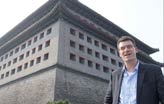Asia Pacific
Asia to continue growth despite risks
Updated: 2011-09-16 06:23
(Xinhua)
DALIAN - As the world's business elites gather in northeast Chinese city of Dalian for the World Economic Forum (WEF), the divergent trends in the Asian and western economies are evident.
While expressing their concerns over the sovereign debt woes in Europe and the budget deficit problem in the United States, economists and observers viewed Asia differently.
Prospects for Asia's leading economies remain relatively good in the face of growing regional and global uncertainty, they said at the ongoing WEF annual meeting of the "New Champions," a three-day event that focuses on growth companies and developing economies,
Asian policymakers' agendas are very different from their counterparts in the United States and the European Union, where growth outlook is around 1.7 percent.
Curbing inflation while maintaining strong growth remains the common challenge facing the Asia economies, particularly in China and India -- two emerging markets with more than 2.5 billion people together.
According to the Manila-based Asian Development Bank, inflation will put pressure on Asian governments to manage price increases even as a faltering global recovery reduces economic growth.
In an outlook update report released on Wednesday, ADB cut its 2011 growth forecast for Asia excluding Japan to 7.5 percent from an April estimate of 7.8 percent, while raised the region's inflation forecast increase to 5.8 percent this year, from an earlier estimate of 5.3 percent.
Still, the economic outlook in Asia is far more better than the United States and the EU.
Take China, the world's second largest economy where a quarter of Asia's GDP comes from, as an example. The Chinese economy grew 9.6 percent in the first half of 2011 and inflation rate eased to 6.2 percent in August from a 37-month high of 6.5 percent in July.
As Premier Wen Jiabao put it at the opening of the WEF meeting, China's economy has taken an orderly shift from being policy stimulus-driven to self generating growth, and is moving in the right direction of macro control.
"I am quite optimistic of a continuous soft landing for China," said Johnny Chen, Chief Executive of Asia Pacific of Zurich Financial Services, Hong Kong, at the WEF meeting.
Jing Ulrich, managing director and chairman of Global Markets of JP Morgan China, said he believed China can keep its economic growth between 7 percent to 8 percent in the coming five years.
The rebuilding efforts in the earthquake and tsunami areas in Japan, the world's third largest economy, will also give extra support for the economy in the Asian region.
Even if the big turbulence triggered by the EU sovereign debt problems turns out to be a recession, as many fear, the shock waves of West effect on Asia will mainly be in terms of exports.
"Under the worst scenario, the situation will not be as bad as 2008 and 2009," said Nariman Behravesh, Chief Economist of IHS.
E-paper

The snuff of dreams
Chinese collectors have discovered the value of beautiful bottles
Perils in relying on building boom
Fast forward to digital age
Bonds that tie China. UK
Specials

Let them eat cake
Cambridge University graduate develops thriving business selling cupcakes

A case is laid to rest
In 1937, a young woman'S body was found in beijing. paul french went searching for her killer

Banking on change
Leading economist says china must transform its growth model soon
